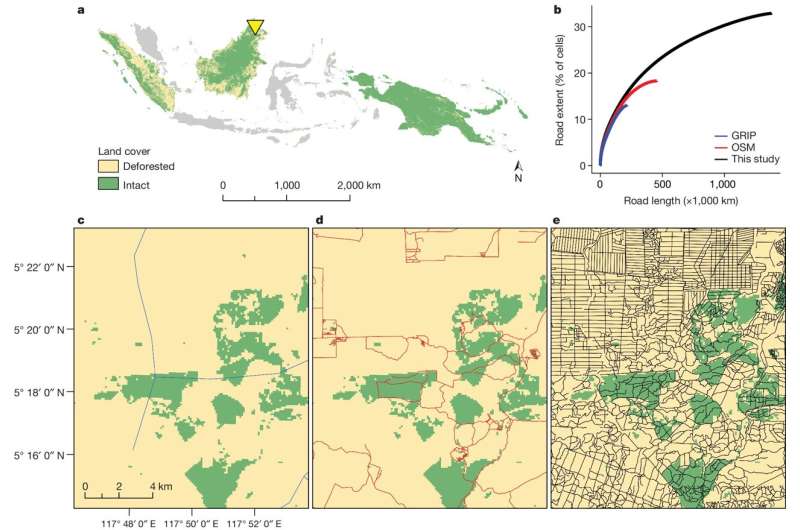This article has been reviewed according to Science X's editorial process and policies. Editors have highlighted the following attributes while ensuring the content's credibility:
fact-checked
peer-reviewed publication
trusted source
proofread
Ghost roads speed destruction of Asia-Pacific tropical forests, finds study

Researchers mapping tropical forests have found many more roads than declared by official sources, which is raising fears of a huge increase in environmental degradation as the pace of road building increases.
James Cook University's Distinguished Professor Bill Laurance recently co-authored a study published in Nature in which more than 200 trained volunteers closely examined satellite pictures of 1.42 million square kilometers of the Borneo, Sumatra and New Guinea islands.
Professor Laurance said roads served important functions, but without effective planning and law enforcement they could unleash a Pandora's box of environmental ills and societal challenges.
"Informally or illicitly constructed 'ghost roads' can be bulldozed tracks in logged forests, roads in palm-oil plantations and other roads missing from existing road datasets for various reasons," said Professor Laurance.
"They're being constructed by a range of people, including legal or illegal agriculturalists, miners, loggers, land grabbers, land speculators and drug traffickers."
He said researchers discovered 3 to 6.6 times more roads in the areas studied than were shown in leading global-road datasets.
"This aligns with findings from earlier studies in other developing nations such as Cameroon and the Solomon Islands and from the Brazilian Amazon.
"By sharply increasing access to formerly remote natural areas, unregulated road development is triggering dramatic increases in environmental disruption due to activities such as logging, mining and land-clearing."
Jayden Engert, a doctoral student at JCU and lead author of the study, said across the study area, road building almost always preceded local forest loss.
"Road density was by far the strongest correlate of deforestation out of 38 potential biophysical and socioeconomic variables," Engert said.
According to Professor Laurance, increasing roads were probably the most important direct threat to tropical forests globally.
"There are some 25 million kilometers of new paved roads expected by mid-century and 90 % of all road construction is happening in developing nations, including many tropical and subtropical regions with exceptional biodiversity," said Professor Laurance.
"Worryingly, our new findings show that the extent and length of roads in the tropical Asia-Pacific is severely underestimated, with many roads being out of government control.
"In these findings, nature is the big loser."
More information: Jayden E. Engert et al, Ghost roads and the destruction of Asia-Pacific tropical forests, Nature (2024). DOI: 10.1038/s41586-024-07303-5
Journal information: Nature
Provided by James Cook University



















